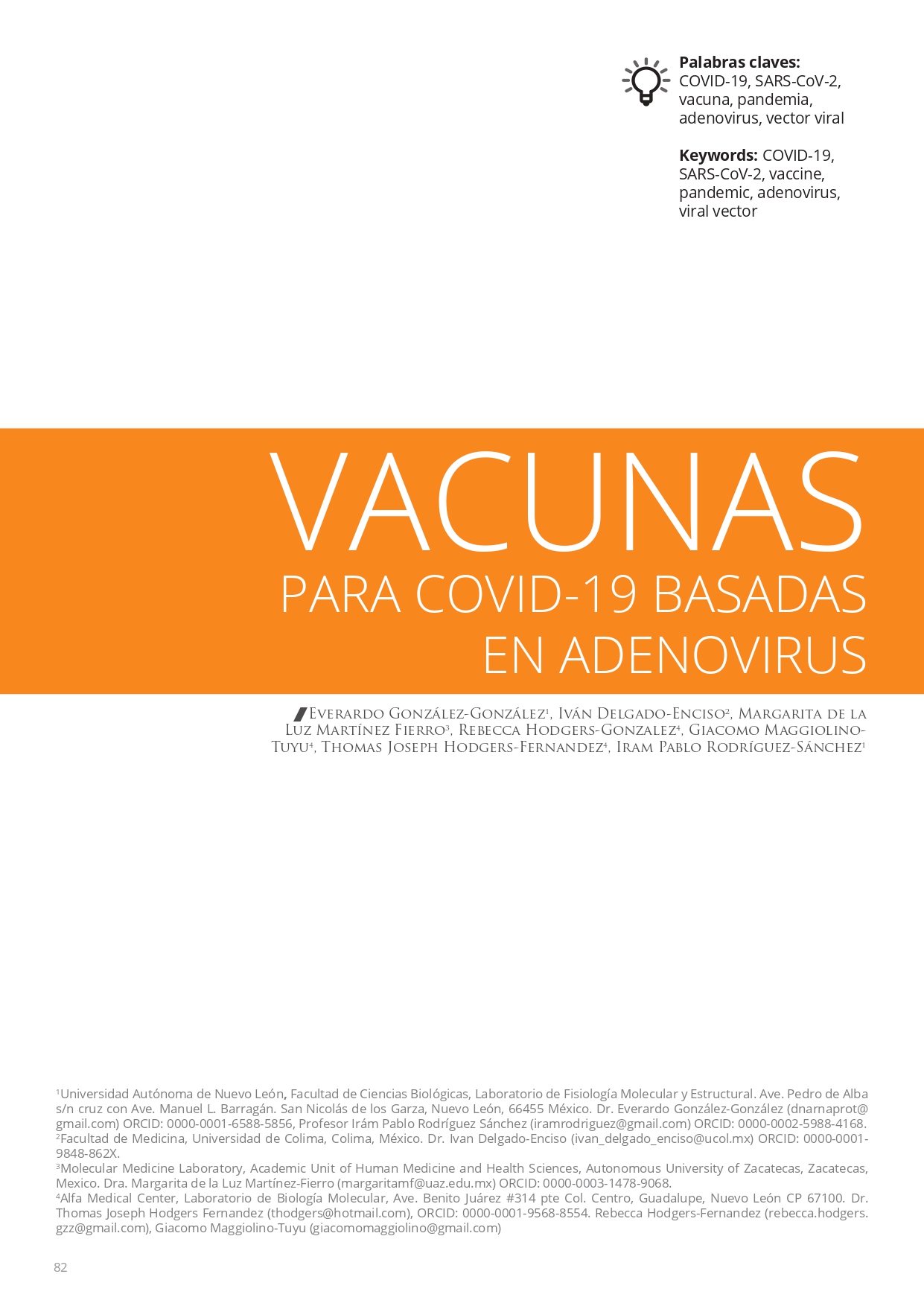Vacunas para COVID-19 basadas en Adenovirus
DOI:
https://doi.org/10.29105/bys7.13-109Keywords:
COVID-19, SARS-CoV-2, vaccine, pandemic, adenovirus, viral vectorAbstract
The COVID-19 pandemic has highly impacted the world, both negatively and positively. On the positive side, we can highlight the outstanding effort that has been made by pharmaceutical companies, governments and schools around the world. This with the intention of responding to this disease with the development of tools for the diagnosis and treatment of COVID-19. An example to mention is the creation of vaccines based on viral vectors, vaccines that have been in the study phase for some time but that the pandemic has accelerated their application in humans. This disease has brought a great advance in health technology, being able to apply the knowledge of years of gene editing to agents such as viruses so that they can be used as vaccines for COVID-19.
Downloads
References
Francis AI, Ghany S, Gilkes T y Umakanthan S. 2022. Review of COVID-19 vaccine subtypes, efficacy and geographical distributions. Postgrad Med J. 98(1159):389–94. DOI: https://doi.org/10.1136/postgradmedj-2021-140654
Ikegame S, Siddiquey MNA, Hung CT, Haas G, Brambilla L, Oguntuyo KY. 2021. Neutralizing activity of Sputnik V vaccine sera against SARS-CoV-2 variants. Nature Communications. 12(1):1–11. DOI: https://doi.org/10.1038/s41467-021-24909-9
Knoll MD y Wonodi C. 2021. Oxford–AstraZeneca COVID-19 vaccine efficacy. The Lancet. 397(10269):72–4. DOI: https://doi.org/10.1016/S0140-6736(20)32623-4
Muñoz-Valle JF, Sánchez-Zuno GA, Matuz-Flores MG, Hernández-Ramírez CO, Díaz-Pérez SA, Baños-Hernández CJ. 2022 Efficacy and Safety of Heterologous Booster Vaccination after Ad5-nCoV (CanSino Biologics) Vaccine: A Preliminary Descriptive Study. Vaccines. 10(3):400. DOI: https://doi.org/10.3390/vaccines10030400
Sharma A y Worgall S. 2016. Adenoviral Vectors Vaccine: Capsid Incorporation of Antigen. Adenoviral Vectors for Gene Therapy: Second Edition. 6;571–90. DOI: https://doi.org/10.1016/B978-0-12-800276-6.00022-X
Self WH, Tenforde MW, Rhoads JP, Gaglani M, Ginde AA, Douin DJ. 2021. Comparative Effectiveness of Moderna, Pfizer-BioNTech, and Janssen (Johnson & Johnson) Vaccines in Preventing COVID-19 Hospitalizations Among Adults Without Immunocompromising Conditions — United States. Morbidity and Mortality Weekly Report. 70(38):1337. DOI: https://doi.org/10.15585/mmwr.mm7038e1

Downloads
Published
How to Cite
License
Copyright (c) 2024 Everardo González-González, Iván Delgado-Enciso, Margarita de la Luz Martínez Fierro, Rebeca Hodgers-Gonzalez, Giacomo Maggiolino-Tuyu, Thomas Joseph Hodgers-Fernandez, Iram Pablo Rodríguez-Sánchez

This work is licensed under a Creative Commons Attribution 4.0 International License.





